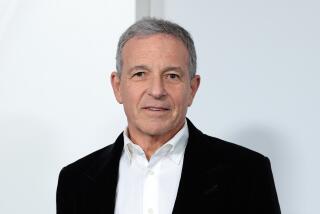Eisner Aims to Be Judicious on Stand
- Share via
GEORGETOWN, Del. — The last time Walt Disney Co. Chief Executive Michael Eisner took the witness stand five years ago, he was confronted with his description of former studio chief Jeffrey Katzenberg as “the little midget.”
This week, in a shareholder suit against current and former Disney directors, he’ll be pressed to explain why he called another one of his top executives, former No. 2 Michael Ovitz, “a psychopath.”
When it comes to high-profile court cases, it seems Eisner’s private zingers come back to zap him, highlighting a management style that can be bruising even by Hollywood standards.
“Anybody who works in the culture and knows him is not surprised by the language,” said Jeffrey Sonnenfeld, associate dean of the Yale School of Management, who has been following the shareholder suit. Eisner, he said, “can be a pretty harsh judge.”
During the next few days, the unvarnished Eisner will be Exhibit A in this town’s small courtroom, where he will be the one judged. Eisner, who began testifying Monday, is defending his role in engineering a stock-and-cash severance for Ovitz that plaintiffs value at $140 million. Ovitz was fired after only 15 months on the job.
The plaintiffs contend that Ovitz’s performance was so poor he should have been ousted without a payout. Accusing the Disney board of rubber-stamping Ovitz’s hiring and firing, the shareholders want $200 million (including interest) returned to the company’s treasury.
In the coming days, the challenge for Eisner will be to avoid an encore of his performance in the Katzenberg case.
Katzenberg alleged that he was denied at least $250 million in bonuses when he left the firm in a bitter falling-out with Eisner in 1994. Katzenberg, now CEO of DreamWorks Animation SKG Inc., ended up settling for an undisclosed sum believed to be close to what he initially sought.
Before the settlement, during a hearing to determine how much Katzenberg should receive, Eisner was no model witness. He became agitated and combative when confronted with disparaging comments he had made about Katzenberg to the author of Eisner’s autobiography, called “Work in Progress.” The remarks became public after Katzenberg’s lawyer, Bert Fields, obtained copies of the author’s notes.
Fields, who cross-examined Eisner, thinks the Disney CEO will be more judicious this time around. “Although it pains me to be on the same side as Michael Eisner,” Fields said, “I’m inclined to think he will perform better.”
Added Los Angeles lawyer Debra Riley, who specializes in business and entertainment law at Winston & Strawn: “The No. 1 challenge is to make sure that [Eisner] comes off as a calm, rational witness.”
In a sense, he has little choice.
Although Eisner and Katzenberg were combatants in the last proceeding, this time the Disney CEO is on the same side as Ovitz. Both men have been sued by the shareholders for their role in the events leading to the huge severance package.
Some of the toughest questions for Eisner are expected to center on a one-page memo he sent to a Disney public relations executive in 1996, shortly after Ovitz was fired. At the time, Eisner believed his second in command was spinning media coverage of the conflict between the two men.
In the document, obtained by the plaintiffs through discovery, Eisner said of Ovitz: “He is a psychopath (Doesn’t know right from wrong), cannot tell the truth. Basically he has a character problem, too devious, too untrustworthy to everybody, and only out for himself.”
The shareholders argue that this and other documents prove that Ovitz should have been terminated “for cause,” negating the severance package.
Lawyers for the defendants counter that the payout could not be blocked because Ovitz’s performance did not constitute gross negligence or malfeasance. They say the much-publicized hiring of the onetime Hollywood super-agent simply did not work out. In a pretrial deposition, Eisner said he was only venting his frustration when he wrote memos that impugned Ovitz.
Ovitz, during his recent testimony in the case, said he was deeply hurt that a man he considered to be one of his closest friends would speak so ill of him. He argued that Eisner failed to empower him and undermined his ideas to improve Disney.
As tempting as it might be for Eisner to fire back, he has been prepped to stay on point, not to sully his co-defendant with personal attacks, said one source familiar with the strategy.
Besides serving his legal interests, such an approach would also help Eisner avoid supplying critics with the kind of fodder he provided with his testimony during the Katzenberg case.
With only about eight months before Eisner’s successor is expected to be named, associates say he’s intent on polishing his reputation, tarnished by this year’s shareholder revolt and his removal as chairman.
“If a judge finds against him and other directors, it will be a big blow to him,” said Charles Elson, professor of corporate governance at the University of Delaware. But, he noted, “this trial has not been a reputation enhancer for anyone involved.”
More to Read
The biggest entertainment stories
Get our big stories about Hollywood, film, television, music, arts, culture and more right in your inbox as soon as they publish.
You may occasionally receive promotional content from the Los Angeles Times.











